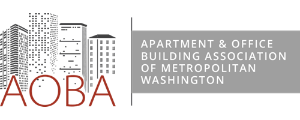Virginia At Issue - December 2019
Housing and General Business Issues Take Center Stage as General Assembly Session Looms
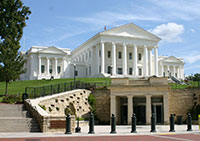 A seismic political shift is anticipated for the upcoming 2020 session of the Virginia General Assembly
A seismic political shift is anticipated for the upcoming 2020 session of the Virginia General AssemblyThe Virginia General Assembly will convene January 8 for its 60-day legislative session. The Democratic takeover of the State Senate and House of Delegates significantly alters the political dynamics in Richmond. The viability of issues affecting AOBA members and the broader business community could shift substantially in 2020.
Once considered a safe harbor for businesses in the region, the Commonwealth could begin to see the advancement of more progressive policies akin to those found in the neighboring jurisdictions of Maryland and D.C. Even issues once considered untouchable, such as Virginia’s revered right-to-work law, find themselves in the political crosshairs.
Several pieces of legislation affecting AOBA members have been introduced in the early days of bill filing. Here are a few of the proposals that have been made public, as well as some anticipated measures:
H.B. 6 – Delegate Jeff Bourne (D-Richmond) introduced legislation to add “source of income” to the list of protected classes under fair housing law, effectively mandating participation in the currently voluntary federal housing choice (“Section 8”) voucher program. AOBA has defeated similar measures numerous times over the last 15 years; however, the issue may find new viability this year as a priority of the Virginia Legislative Black Caucus.
H.B. 77 – Delegate Sam Rasoul (D-Roanoke) has introduced the Virginia Green New Deal Act. The bill would place a moratorium on the approval of any new fossil fuel-burning electric generation and/or pipeline construction. It would also require that at least 80 percent of electricity sold be from clean energy sources. The bill goes on to authorize local governments to require a 36 percent reduction in electric energy consumption in all buildings by 2035.
H.B. 99 – Delegate Sam Rasoul (D-Roanoke) also filed legislation to add victims of family abuse to the list of protected classes under fair housing law. AOBA has inquired with the Delegate to determine the impetus for the bill.
H.J. 2 – Delegate Jeff Bourne (D-Richmond) submitted a Constitutional amendment to allow local governments to fully or partially exempt affordable housing from real property taxation.
S.B. 115 – At the request of Arlington County, Senator Barbara Favola (D-Arlington) filed legislation to require that any notice of lease termination served to a tenant would be invalid if it did not include the contact information for the local legal services program. While this does not represent a tremendous burden to the housing provider, most tenants will not qualify for legal aid, so this may not be the optimal resource for tenants. AOBA will work with the Senator to try to identify a better approach.
Only a small number of bills have been introduced to date. It is anticipated that the General Assembly will ultimately consider and act upon more than 3,000 individual pieces of legislation during the 60-day legislative session. Though they have not yet been made public, AOBA anticipates the introduction of legislation to extend the current five-day “pay-or-quit” notice period; eliminate any consequence for the late payment of rent; add a first right of refusal for tenants upon sale of certain residential properties; establish a statewide landlord registry; and cap allowable late fees for non-payment of rent.
Stay tuned to the Virginia Advocacy Webpage for in-depth information throughout the legislative session. Click here for a quick video preview of the 2020 General Assembly session from your Virginia government affairs team.
Longtime AOBA Friend Appointed Chairman of Influential House Committee on General Laws
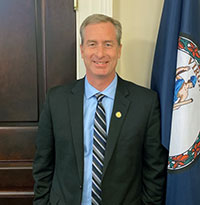 Delegate David Bulova (D-Fairfax) will Chair the House Committee on General Laws, through which the bulk of AOBA’s legislative agenda is vetted
Delegate David Bulova (D-Fairfax) will Chair the House Committee on General Laws, through which the bulk of AOBA’s legislative agenda is vettedSpeaker-Designee Eileen Filler-Corn has begun assigning leadership positions. After Northern Virginia swept the party leadership voting, another Northern Virginian has been appointed to head the influential Committee on General Laws, through which the bulk of AOBA’s legislative agenda is vetted.
Delegate David Bulova (D-Fairfax) will chair the Committee on General Laws, giving him significant influence over legislative matters pertaining to property management, landlord/tenant law, fair housing and other matters affecting AOBA members. AOBA and other real estate groups had advocated for his appointment to the position.
AOBA has enjoyed a longstanding positive working relationship with Delegate Bulova during his 14 years in office. He currently serves as a member of the Housing Subcommittee and the Virginia Housing Commission, thus bringing substantial familiarity with AOBA’s issues. Virginia will be well served by his evenhanded and thoughtful approach.
Meet the New Members of the Virginia General Assembly
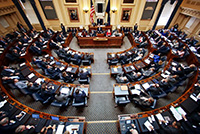 Nineteen new members will be sworn in at the commencement of the 2020 Virginia General Assembly session
Nineteen new members will be sworn in at the commencement of the 2020 Virginia General Assembly sessionNineteen new members will be sworn in as the General Assembly convenes in January for its 60-day legislative session. As a part-time legislature, members of the Virginia General Assembly come from diverse backgrounds and bring their own unique professional expertise to the job.
Combined with last cycle’s freshman class of 17, 40 percent of the House now have two years or less of legislative experience. This places additional onus on AOBA to build relationships with and educate newly elected officials with regard to the policy implications of proposals affecting commercial and multifamily property owners and managers.
AOBA has compiled brief biographical information to help members get to know the new Delegates and Senators. Click here to meet the new members of the General Assembly.
Eviction Rates Have Declined 14% in Virginia in the Last Year
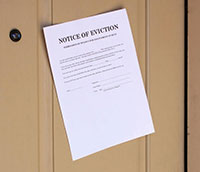 Eviction rates are down by 14% across Virginia
Eviction rates are down by 14% across VirginiaLess than six months after a package of legislative changes advanced by industry took effect, eviction rates are already declining substantially in Virginia.
Eviction reduction drew significant political attention in Virginia last year after a Princeton University report identified Virginia as having the worst eviction rates in the country. AOBA discovered that the study’s findings were overstated by approximately 85 percent, as it counted unlawful detainer filings rather than actual executed evictions. In spite of the false basis in the report’s findings, AOBA and other real estate groups took a proactive approach, recognizing that reducing evictions mutually benefits housing providers as well as tenants. AOBA worked through the Virginia Housing Commission to craft a consensus legislative package consisting of six policy changes designed to reduce evictions and ensure fairness in the legal process without unduly impinging upon the ability for housing providers to efficiently manage their properties. The bills were overwhelmingly approved by the General Assembly and took effect July 1 of this year.
Now, just less than six months out, they appear to be having a significant impact already. Richmond news affiliate WHSV 3 reports that eviction filings are notably down from previous calendar years. 2018 saw a reduction of roughly 19 percent statewide from the 2017 numbers cited in the Princeton University report. Even further declines are reported for 2019, with eviction filings down another 14 percent. Actual evictions are still not being tracked.
Governor Announces Historic Investment in Affordable Housing
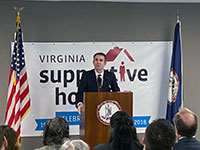 Governor Northam announced this week that he would include $63 million in his proposed budget to support the development of affordable housing
Governor Northam announced this week that he would include $63 million in his proposed budget to support the development of affordable housingAffirming his commitment to prioritizing affordable housing, Governor Ralph Northam announced this week that he would include $92 million in new funding investments in his budget proposal. This includes $63 million to be directed toward the Virginia Housing Trust Fund, which serves as a loan program to help finance the construction of new affordable housing development.
The Housing Trust Fund is currently capitalized at a level of only $21 million. The new investment would triple the fund’s balance. The remainder of new funds will be designated for rental assistance for individuals with intellectual disabilities and eviction prevention programs.
Click here to read the Governor’s full press release.
Scooters No Longer Allowed on Sidewalks in Alexandria
 A new City policy prohibits scooters on sidewalks in Alexandria
A new City policy prohibits scooters on sidewalks in AlexandriaThis month, the Alexandria City Council voted to launch a phase two pilot program to regulate dockless mobility devices, also known as e-scooters, which will take effect Jan. 1. Due to resident safety concerns, the major change coming from the program will include a sidewalk riding ban throughout the city. Although City staff had recommended a ban in part of Old Town and all of Mount Vernon Avenue, the City Council opted to ban riding on sidewalks completely. Additionally, the pilot program sets the speed limit to 15 mph on the street.
Scooters are permitted to be parked on sidewalks, although the city has installed parking corrals under the current pilot program to address resident concerns about improper parking of scooters. The current parking corral locations are in Old Town, and talks are underway for potential additions in Del Ray, Carlyle and Potomac Yard.
Additionally, the new program designates specific percentages of devices to deploy to underserved areas to promote equity. The area west of Quaker Lane and east of I-395 would get 15 percent of deployed devices, the area west of I-395 would get 10 percent, and Arlandria would get five percent.
Scooter companies will also be required to pay new permit fees and sign a modified Memorandum of Understanding under the new pilot program. The Council has directed the city manager to appoint an Ad-Hoc Scooter Task Force for phase two of the program.
The new regulations come under Virginia law citing that e-scooters would be allowed without regulations starting Jan. 1, 2020 if local jurisdictions did not set their own regulation programs. The City of Alexandria joins surrounding jurisdictions including Fairfax County and Falls Church, who are also adopting e-scooter pilot programs due to the new state legislation.
